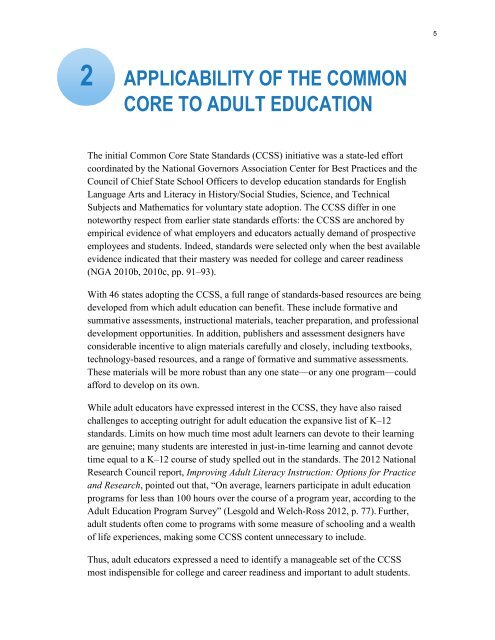CCRStandardsAdultEd
You also want an ePaper? Increase the reach of your titles
YUMPU automatically turns print PDFs into web optimized ePapers that Google loves.
5<br />
2 APPLICABILITY OF THE COMMON<br />
CORE TO ADULT EDUCATION<br />
The initial Common Core State Standards (CCSS) initiative was a state-led effort<br />
coordinated by the National Governors Association Center for Best Practices and the<br />
Council of Chief State School Officers to develop education standards for English<br />
Language Arts and Literacy in History/Social Studies, Science, and Technical<br />
Subjects and Mathematics for voluntary state adoption. The CCSS differ in one<br />
noteworthy respect from earlier state standards efforts: the CCSS are anchored by<br />
empirical evidence of what employers and educators actually demand of prospective<br />
employees and students. Indeed, standards were selected only when the best available<br />
evidence indicated that their mastery was needed for college and career readiness<br />
(NGA 2010b, 2010c, pp. 91–93).<br />
With 46 states adopting the CCSS, a full range of standards-based resources are being<br />
developed from which adult education can benefit. These include formative and<br />
summative assessments, instructional materials, teacher preparation, and professional<br />
development opportunities. In addition, publishers and assessment designers have<br />
considerable incentive to align materials carefully and closely, including textbooks,<br />
technology-based resources, and a range of formative and summative assessments.<br />
These materials will be more robust than any one state—or any one program—could<br />
afford to develop on its own.<br />
While adult educators have expressed interest in the CCSS, they have also raised<br />
challenges to accepting outright for adult education the expansive list of K–12<br />
standards. Limits on how much time most adult learners can devote to their learning<br />
are genuine; many students are interested in just-in-time learning and cannot devote<br />
time equal to a K–12 course of study spelled out in the standards. The 2012 National<br />
Research Council report, Improving Adult Literacy Instruction: Options for Practice<br />
and Research, pointed out that, “On average, learners participate in adult education<br />
programs for less than 100 hours over the course of a program year, according to the<br />
Adult Education Program Survey” (Lesgold and Welch-Ross 2012, p. 77). Further,<br />
adult students often come to programs with some measure of schooling and a wealth<br />
of life experiences, making some CCSS content unnecessary to include.<br />
Thus, adult educators expressed a need to identify a manageable set of the CCSS<br />
most indispensible for college and career readiness and important to adult students.


